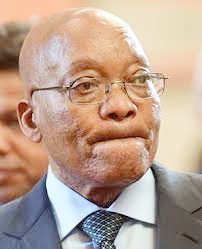Former South African president Jacob Zuma has been nominated as the presidential candidate for the uMkhonto weSizwe (MK) party but question marks remain on whether the law supports his candidacy.
MK youth leader Bonginkosi Khanyile on Wednesday announced Zuma as the party’s presidential candidate for South Africa’s upcoming national and provincial elections slated for May 29.
Addressing journalists, Khanyile declared that Zuma is “the only man we are voting for in the coming elections.”
“Officially (and) for the first time to the public, we are unveiling Jacob Gedleyihlekisa Zuma as the MK presidential candidate. President Zuma is the official face of MK,” Khanyile said.
Zuma has expressed ambitions to return to the presidency to “fix things” that have gone wrong since his ouster from power in February 2018 when he was recalled from the governing African National Congress (ANC) and replaced by his former deputy, Cyril Ramaphosa.
The recall followed damning allegations linking the former president to high-level corruption involving a syndicate of politicians and businesspeople that had taken control of the government procurement system.
Zuma’s presidential aspirations could, however, face legal hurdles as South Africa’s constitution currently prevent him from returning to Union Buildings again since he has already served the maximum two terms as president.
Legal experts say the Constitutional Court would have to clarify the legal position in the case of Zuma since he did not finish his second term as he left government in 2018 just before his term ended in 2019.
Although the constitution is clear that South African presidents can serve only two terms, it is silent on what happens when the president does not finish the second term. This has left legal experts to argue that the “reasonable understanding of silence rule is NO”.
Should Zuma’s candidature as the MK’s presidential hopeful be turned down by the Independent Electoral Commission of South Africa, the party would have to the Constitutional Court for clarification on the matter.
A defiant Khanyile, however, insisted that MK members are prepared to “lay down their lives” if Zuma or the party are removed from the ballot paper.
MK party leader in Zuma’s native KwaZulu-Natal province Visvin Reddy recently warned of a potential civil war if the party is not included on the ballot papers.
South Africans go to the polls in just over two months, with surveys suggesting that the MK party, under Zuma’s leadership, could take a significant share of the vote from the ANC in KwaZulu-Natal, potentially impacting at least two other parties.
Zuma’s ethnic identity, which played a significant role in past elections, could again be a factor.
This development suggests a potential shift in South Africa’s political landscape, with Zuma’s nomination likely to have a significant impact on the electoral outcomes.
However, everything would depend on whether the MK would be able to surmount the constitutional hurdle or not.
JN/APA


